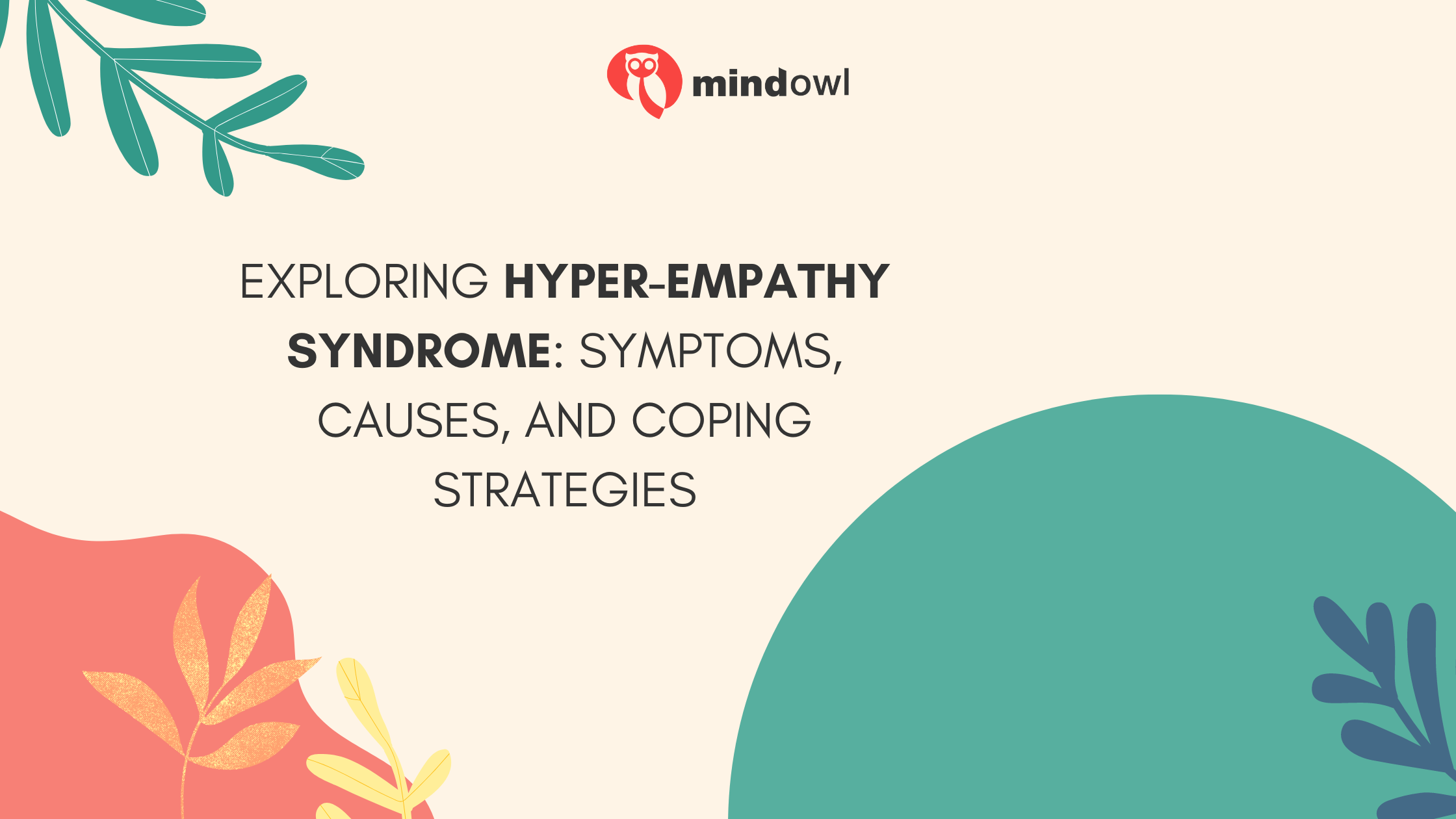Have you ever felt like you’re carrying the weight of others’ emotions on your shoulders? The hyper-empathy syndrome is a profound emotional response where individuals deeply feel and sometimes even physically experience the emotions of those around them.
This article will explore what hyper-empathy is, its symptoms, and ways to manage this overwhelming wave of feelings. Read on to navigate through the complexities of hyper-empathy and find relief.
Key Takeaways
- Hyper – Empathy Syndrome is where you feel others’ emotions very strongly, as if they are your own, and can lead to stress.
- It’s different from being highly sensitive. People with hyper-empathy struggle to set boundaries and may neglect their needs.
- Symptoms include poor personal boundaries, codependency, anxious attachment styles, anxiety disorders, and sometimes traits of Borderline Personality Disorder.
- Coping strategies involve setting clear boundaries; practising self-care; seeking therapy; using mindfulness and relaxation techniques; learning to separate your own feelings from those of others; and developing self-empathy.
- Research suggests hyper-empathy might have a genetic link. Some brain chemicals that handle empathy could cause it.
What is Hyper-Empathy Syndrome?

Definition
Hyper-empathy syndrome means you feel other people’s emotions as if they were your own. It can be too much at times. This condition brings empathy to a higher level than what most experience.
You might absorb feelings of sadness or joy from friends like a sponge, making it hard to know where their emotions end and yours begin.
Empathy helps us connect with others—it lets us understand how someone else is feeling by putting ourselves in their shoes. But for those with hyper-empathy syndrome, this ability goes into overdrive.
They don’t just understand someone else’s pain; they actually feel it, sometimes even more intensely than the person who’s going through it. This intense emotional connection sets the scene for different types of empathy which we’ll explore next.
Types of empathy
Empathy is how we understand what others feel. Different kinds of empathy affect us in various ways.
- Cognitive Empathy: This type lets us put ourselves in another person’s shoes. We see their perspective and think about their feelings. It’s like reading a map of someone else’s thoughts.
- Affective or Emotional Empathy: With this kind, we actually feel other people’s emotions. If they’re sad or happy, we feel it too. This can be strong in people with hyper-empathy syndrome.
- Compassionate Empathy: Here, we not only understand and feel but also want to help. It moves us to act, to offer support or kindness to the person hurting.
Difference between high empathy and hyper-empathy
High empathy means you understand and share other people’s feelings. You can put yourself in their shoes without losing sight of your own emotions. It helps you connect with others and offer compassion.
Hyper-empathy is much more intense. If someone feels sad, you feel just as sad as if it were happening to you. This may lead to an overwhelming sense of others’ pain or joy.
Having too much empathy makes it hard to manage your own feelings. You might neglect your needs because you’re so tuned into what others are going through. It’s good to care for others, but not at the cost of looking after yourself.

Signs and Symptoms of Hyper-Empathy
Poor personal boundaries
People with hyper-empathy often find it hard to say no. They might take on too much because they feel the pain of others deeply. This can lead them to ignore their own needs and feelings.
It’s like having an open door policy for everyone else’s problems, leaving no room for personal space or private time.
This lack of boundaries may cause stress and emotional burnout. Individuals end up feeling overwhelmed because they absorb so much from those around them. They struggle to separate their own emotions from those they sense in others, which can result in mood swings and anxiety.
Codependency
Codependency involves repeatedly putting someone else’s needs before your own. In a codependent relationship, you might rely too much on another person for emotional or mental support.
Controlling behaviours and self-sacrifice also signal this issue. Often, those who are codependent neglect their own needs to focus on helping others.
Childhood trauma is sometimes the root of codependency as adults try to recreate dynamics they’re familiar with. This can lead to an unhealthy balance in relationships where one’s well-being hinges on another person’s state.
People with such tendencies can become emotionally drained as they pour themselves into others, forgetting to care for their own health and happiness.
Anxious attachment
While codependency often involves relying too much on others, anxious attachment digs deeper into emotional bonds. People with this type of attachment might cling tightly due to fear of being left alone.
They worry a lot about their relationships and may doubt the worthiness of love. These insecurities can make them seek constant reassurance from friends or partners.
Their early life may have been filled with unpredictable care, leading to mistrust in future relationships. This lack of trust battles with their strong desire for closeness, creating a stressful tug-of-war inside them.
They chase after approval and fear rejection deeply because they see themselves negatively and believe others will too.
Anxiety disorder
Anxiety from feeling too much can be tough. Empaths often feel the weight of others’ emotions, leaving them overwhelmed. This intense connection can spark anxiety disorders in some people.
They may start to worry a lot or feel scared about things that haven’t even happened.
Imagine your mind racing with someone else’s worries as if they were your own. That is what happens to those dealing with hyper-empathy and anxiety disorders. It can lead to constant stress and fear, making daily life really hard.
These feelings happen because of the brain’s response to emotional overload. People might have trouble sleeping, feel tired all the time, or have stomachaches. They might also get cranky more easily or avoid friends and family because it feels like too much.
Lack of empathy for self
Individuals experiencing hyper-empathy syndrome may struggle with a lack of empathy for themselves. This can lead to difficulties in setting healthy boundaries, taking care of their own needs, and distinguishing their emotions from those of others.
A blurred sense of self and neglecting personal needs are common challenges faced by individuals with hyper-empathy, impacting their overall well-being and relationship dynamics.
A lack of empathy for oneself can have negative implications on communication, relationships, and prosocial behaviour. As these individuals prioritise others’ emotions over their own, they may experience heightened levels of cortisol due to chronic stress from neglecting personal needs.
Victimhood and projection
Individuals struggling with hyper-empathy and poor personal boundaries may often find themselves slipping into a victim mentality. This can be especially pronounced for those who have experienced trauma in the past, as their empathy for others might lead them to internalise a sense of perpetual suffering.
As a result, they might struggle to assert healthy boundaries and instead project their own emotions onto others, potentially leading to misunderstandings and conflicts. It’s essential for individuals dealing with hyper-empathy to recognise these tendencies and work on developing strategies to maintain a balanced perspective.
Borderline personality disorder
Borderline Personality Disorder (BPD) is a complex mental health condition. It leads to unstable and intense relationships, extreme emotions, and impulsive behaviours due to hypersensitivity to rejection.
People with BPD often struggle with managing their emotions and self-image. This can result in unstable personal relationships and impulsive actions which affect their daily lives significantly.
BPD is characterized by difficulties in maintaining stable interpersonal relationships and regulating emotions effectively. Individuals with BPD may experience intense feelings of loneliness, anger, or emptiness, leading to impulsive decisions like substance abuse or reckless behaviour.
Is Hyper-Empathy Just Highly Sensitive or a Mental Health Issue?
Differentiating hyper-empathy from highly sensitive personality traits
Highly sensitive people (HSPs) have a heightened awareness of the emotions and moods of others, providing valuable insights into their feelings. On the other hand, hyper-empathy causes individuals to absorb others’ emotions intensely, leading to powerful physical and emotional reactions.
While HSPs maintain healthy personal boundaries, hyper-empathetic individuals tend to struggle with setting limits and often neglect their own needs.
Research shows that highly sensitive persons demonstrate empathy without absorbing or internalising others’ emotions as their own. In contrast, those with hyper-empathy find it difficult to distinguish between their own emotions and those they absorb from others.
The link between hyper-empathy and mental health issues
Research suggests that individuals with hyper-empathy syndrome may be at a higher risk of experiencing psychiatric disorders such as anxiety, borderline personality disorder, and depression.
This excessive empathy can lead to neglecting one’s own emotional well-being, resulting in heightened levels of stress and emotional exhaustion. Such individuals often absorb the negative emotions of those around them, leading to their own mental health challenges.
Studies indicate a potential link between empaths and anxiety due to their high affective empathy, causing them to deeply experience the emotions of others. The impact on mental health is clear – excessive empathy can lead to overwhelming feelings that negatively affect an individual’s psychological state.
Effects of Hyper-Empathy Syndrome
On the person experiencing it
Experiencing hyper-empathy can lead to extreme distress, making it challenging to manage one’s own emotions and navigate social interactions. People with hyper-empathy might find themselves overwhelmed by the emotions of others, neglecting their own needs and well-being in the process. This can result in difficulties in maintaining meaningful relationships and taking care of personal mental health.
While feeling deeply for others is a positive trait, excessive empathy may cause anxiety and emotional strain, especially when loved ones are suffering. The inability to distinguish between one’s feelings and those of others can lead to a constant state of emotional turmoil for individuals dealing with hyper-empathy.
On others around them
When individuals with hyper-empathy interact with others, it can significantly impact the emotional well-being of those around them. Their tendency to absorb and internalise the emotions of others may lead to emotional exhaustion for their friends and family.
Moreover, their struggle to establish personal boundaries can result in difficulty maintaining healthy interactions, which further affects the social relationships and emotional stability of people close to them.
Being unable to maintain a balance between their own emotions and those they absorb from others can create an environment where loved ones may feel emotionally overwhelmed or drained due to the unintentional emotional burden placed on them.
Genetic and Neuro-Physiological Basis for Hyper-Empathy
Innate temperament
Hyper-empathy can be linked to an individual’s innate temperament. Research suggests that sensory processing sensitivity, which is considered an inherent trait, may contribute to heightened sensitivity towards environmental and social stimuli.
This increased sensitivity could potentially play a role in the development of hyper-empathy, indicating a genetic predisposition towards this condition. Understanding the genetic and neuro-physiological basis for hyper-empathy can provide valuable insights into its origins and guide effective coping strategies for individuals experiencing this syndrome.
Nurture vs. nature
The nature vs. nurture debate explores genetic and environmental influences on mental health issues like depression. Research in genetics and neurobiology is proving that behaviour associated with personality disorders has a basis in genetics and neurology.
Neuroscience research also indicates that innate temperament plays a significant role in an individual’s empathetic tendencies, but environmental factors can further shape these traits.
Neuroscience research
The study of hyper-empathy syndrome delves into genetics and neurobiology to understand its basis. Genes can impact the shortage of brain chemicals linked to empathy, influencing an individual’s empathetic abilities.
Ongoing research aims to examine hyper-empathy disorder, including tests, symptoms, and its association with conditions like autism and borderline personality disorder. This multifaceted approach incorporates social psychology, cognitive neuroscience, and clinical neuropsychology in proposing a model for empathy dysfunction.
Neuroscientists are uncovering that altered developmental trajectories in empathy may increase the risk for internalising disorders. Furthermore, ongoing interest among psychologists and neuroscientists underscores the complexity surrounding the study of empathy.
Coping Strategies for Hyper-Empathy Syndrome
Setting boundaries
Establishing and communicating healthy emotional boundaries is vital for managing hyper-empathy. This involves recognising personal limits and clearly articulating them to others, creating a safe space for self-care.
Neglecting one’s own needs and emotions can lead to emotional exhaustion, making it crucial to prioritise setting boundaries as a form of self-protection. People with hyper-empathy often face challenges in this area, but it is an essential step towards maintaining well-being.
Practising self-care
To manage hyper-empathy, setting boundaries is crucial for protecting your emotional well-being. Engaging in self-care practices like mindfulness and relaxation techniques can help regulate overwhelming emotions.
Practising self-compassion is essential for addressing symptoms of anxiety and depression often linked to excessive empathising with others’ suffering.
Seeking therapy
Professional guidance from a therapist or counsellor can help develop coping strategies to manage overwhelming emotions and avoid neglecting personal needs.
Therapeutic interventions such as cognitive behavioural therapy (CBT) can aid in setting healthy boundaries and equipping individuals to navigate the daily challenges associated with excessive empathy.
Seeking therapeutic assistance helps individuals gain insight into their empathetic tendencies and learn effective ways to channel their compassion without compromising their well-being.
Finding healthy outlets for emotions
Incorporate regular physical activity into your routine, such as jogging, yoga, or dancing. Engaging in exercise can help release built-up emotions and promote mental well-being. Additionally, journaling or expressing yourself through art can serve as a therapeutic outlet for processing and releasing intense emotions.
These creative activities can provide a safe space to explore and understand your feelings without judgment.
You may also find comfort in connecting with nature by spending time outdoors. Taking walks in natural settings or simply sitting quietly outside can offer a sense of calmness and rejuvenation.
Learning to distinguish between own emotions and others’
Understanding the difference between our own emotions and those of others is crucial for managing hyper-empathy syndrome. Developing this ability helps in setting healthy emotional boundaries and prevents taking on other people’s feelings as our own.
By recognising and acknowledging the distinction, individuals can better navigate their own emotional well-being while still being empathetic toward others’ experiences.
Being able to differentiate between personal emotions and external ones is an essential coping strategy for individuals dealing with the hyper-empathy syndrome, ensuring they take care of their mental and emotional health without neglecting their empathetic nature towards others.
Incorporating mindfulness and relaxation techniques
Engaging in mindfulness-based practices, such as meditation or deep breathing exercises, enables individuals to cultivate a greater sense of self-awareness and emotional regulation.
These techniques not only help in managing anxiety and overwhelming feelings but also promote a deeper understanding of one’s own emotional boundaries, which is crucial for those struggling with hyper-empathy.
Mindfulness practices have been shown to effectively reduce compassion fatigue and negative affect, providing relief from the emotional burden that often accompanies hyper-empathy syndrome.
Developing self-compassion and self-empathy
Cultivating self-compassion involves treating oneself with kindness and understanding, and acknowledging personal suffering without judgement. It also includes recognising that imperfection is a shared human experience, allowing for greater emotional resilience and well-being despite the challenges of hyper-empathy syndrome.
Additionally, nurturing self-empathy means extending the same level of empathy towards oneself as one would to others, creating a sense of balance in managing emotions effectively.
Conclusion
Understanding the hyper-empathy syndrome is crucial for recognising the impact of extreme empathy on individuals’ well-being. Implementing coping strategies like setting boundaries, self-care practices, and seeking therapy can help manage the challenges posed by hyper-empathy.
It’s essential to acknowledge that while hyper-empathy isn’t officially recognised as a disorder, its real effects on those experiencing it necessitate support and understanding from both individuals and society.
Seeking treatment and support is vital in managing symptoms associated with hyper-empathy syndrome and promoting emotional well-being for those affected.
FAQs
1. What does hyper-empathy syndrome mean?
The hyper-empathy syndrome is when a person feels others’ emotions very strongly and often neglects their own needs because of their desire to help.
2. Can someone have too much empathy?
Yes, having too much empathy can lead to hyper-empathy, where you might feel overwhelmed by others’ emotions and it causes anxiety.
3. What are the signs that someone has hyper-empathy syndrome?
Signs include feeling extreme empathy towards others, struggling to set healthy boundaries, and experiencing negative feelings from absorbing the emotional states of those around you.
4. Is it possible for people with autism or bipolar disorder to show high levels of empathy?
People on the autism spectrum or with bipolar disorder can show different levels of cognitive and affective empathy, sometimes including excess empathy.
5. How do people cope with hyper-empathy syndrome?
Coping strategies include learning techniques like cognitive behavioural therapy to manage your sense of empathy and take care of your own needs while understanding another person’s perspective.
6. Why shouldn’t empathetic people ignore their own feelings?
If an empathetic person always puts themselves in someone else’s shoes without caring for their own needs, they may end up feeling drained or stressed.
MindOwl Founder – My own struggles in life have led me to this path of understanding the human condition. I graduated with a bachelor’s degree in philosophy before completing a master’s degree in psychology at Regent’s University London. I then completed a postgraduate diploma in philosophical counselling before being trained in ACT (Acceptance and commitment therapy).
I’ve spent the last eight years studying the encounter of meditative practices with modern psychology.

